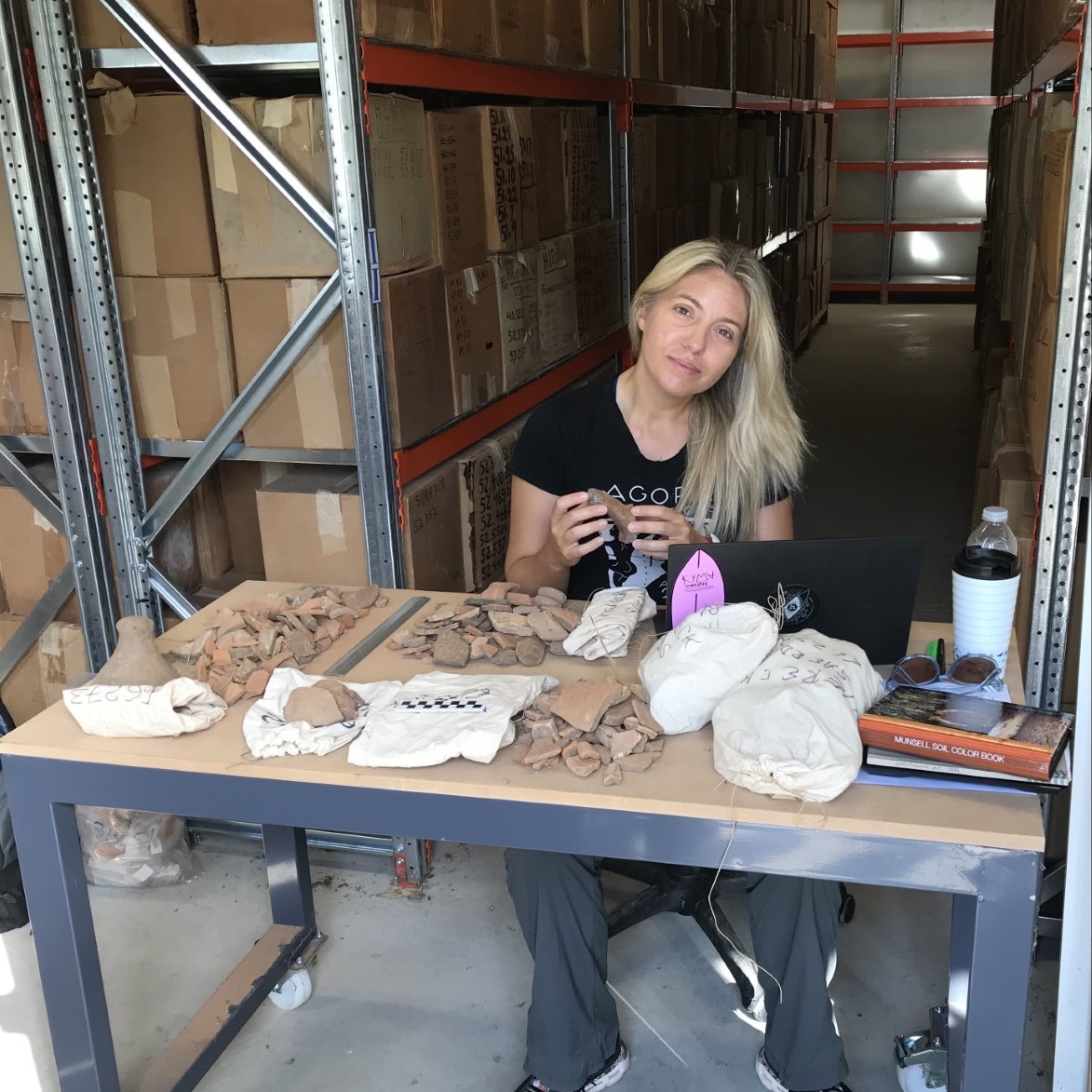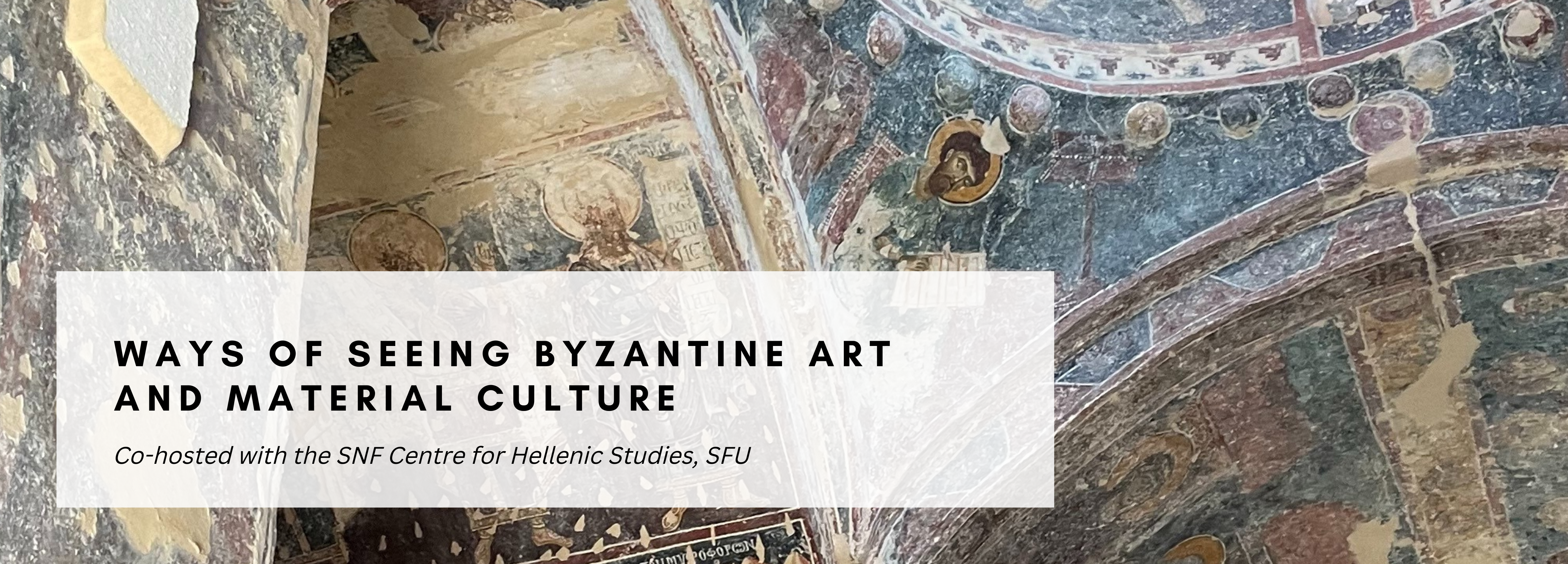
-
Fotini Kondyli, Art, University of Virginia
Coach House, Green College, UBC and livestreamed
Thursday, April 27, 5-6:30pm, with reception to followin the series
Ways of Seeing Byzantine Art and Material Culture -
Livestream link:
https://ubc.ca.panopto.com/Panopto/Pages/Viewer.aspx?id=1cb592e8-a06a-4867-87b3-afdc013be55e
To ask a question:
1. Open www.slido.com in another tab or window
2. Enter event code: 102023
3. Type your questionFotini Kondyli seeks to reconstruct the topography and spatial layout of Byzantine Athens (4th-15th centuries CE), and better understand contemporary living conditions and socioeconomic activities in the city. Emphasis is placed on city-making processes and particularly the role of non-elite, ordinary people in them. Like modern cities, Byzantine ones were stages of key political events ranging from rituals that celebrated imperial power to riots and acts of resistance. Fotini thus approach Byzantine cities as highly political environments and explores city-making activities as political actions. In doing so, she pays equal attention to monumental public spaces as well as streets, open unbuilt areas and common areas out and around houses. She also examines changes in the urban environment that points to ordinary people's involvement, and consider the impact of such activities in enhancing their social capital and political influence. Her project provides new approaches to the reconstruction of Byzantine cities by attempting to rewrite Athens’ history from the perspective of ordinary people’s individual and collective experiences. It also contributed to a diachronic study of urban phenomena including civic groups, urban planning and political action.
 Fotini Kondyli (NEH Horace W. Goldsmith Distinguished Teaching Professor of Byzantine Art and Archaeology) is a Byzantine archaeologist who works on the Late Antique, Byzantine and Frankish periods (5th-15th centuries). Her research interests include spatial practices, community-building processes and the material culture of Byzantine non-elites. She also works on cultural, economic and political networks in the Eastern Mediterranean in the Late Byzantine period (13th- 15th centuries). Her work brings together archaeology, archival research, spatial analysis and the digital humanities. She is the author of Rural Communities in Late Byzantium, Resilience and Vulnerability in the Northern Aegean (2022), which argues for resilient island rural communities and seeks to reinstate non-elites in the historical narrative, pointing to their ability to cope with environmental, demographic and political crises and initiate changes that contributed to their survival and well-being. She is also the co-editor of The Byzantine Neighbourhood. Urban Space and Political Action (2022). As an active field archaeologist, Fotini has worked in numerous archaeological sites in Greece, Albania, Turkey, the United Kingdom and Germany. She is currently involved in three archaeological projects in Greece: at the Athenian Agora, the Thebes Synergasia Excavation Project and the Mazi Archaeological Project.
Fotini Kondyli (NEH Horace W. Goldsmith Distinguished Teaching Professor of Byzantine Art and Archaeology) is a Byzantine archaeologist who works on the Late Antique, Byzantine and Frankish periods (5th-15th centuries). Her research interests include spatial practices, community-building processes and the material culture of Byzantine non-elites. She also works on cultural, economic and political networks in the Eastern Mediterranean in the Late Byzantine period (13th- 15th centuries). Her work brings together archaeology, archival research, spatial analysis and the digital humanities. She is the author of Rural Communities in Late Byzantium, Resilience and Vulnerability in the Northern Aegean (2022), which argues for resilient island rural communities and seeks to reinstate non-elites in the historical narrative, pointing to their ability to cope with environmental, demographic and political crises and initiate changes that contributed to their survival and well-being. She is also the co-editor of The Byzantine Neighbourhood. Urban Space and Political Action (2022). As an active field archaeologist, Fotini has worked in numerous archaeological sites in Greece, Albania, Turkey, the United Kingdom and Germany. She is currently involved in three archaeological projects in Greece: at the Athenian Agora, the Thebes Synergasia Excavation Project and the Mazi Archaeological Project.

What can we learn from the study of a distant premodern culture today? Where does the Roman polity that we call Byzantium stand within the wider medieval world, and how does its place in our imagination shape the way we study Byzantine monuments, objects and sites? This lecture series provides a venue for presenting cutting-edge and innovative research by scholars of Byzantine art, archaeology and material culture. In particular, it seeks to contribute to wider discussions across UBC, SFU, the academic community and the wider public about the cultural heritage and the underrepresented cultures of the medieval world before the age of European colonialism. Given the recent turn towards the Global Middle Ages in medieval studies, we have invited scholars who examine Byzantium and its material culture in an international context and acknowledge the necessity of placing the Byzantine in dialogue with other premodern societies in and beyond the Mediterranean.
This academic year, Green College brings together exciting and important voices in the field of Byzantine studies to showcase the rich variety of disciplinary approaches in the field and to engage critically with a diverse range of topics.
This series is co-hosted with the SFN Centre for Hellenic Studies at Simon Fraser University.

-
Unless otherwise noted, all of our lectures are free to attend and do not require registration.
6201 Cecil Green Park Rd
Green College, UBC
Vancouver, BC V6T 1Z1
Canada
Custom Lecture Fields
|